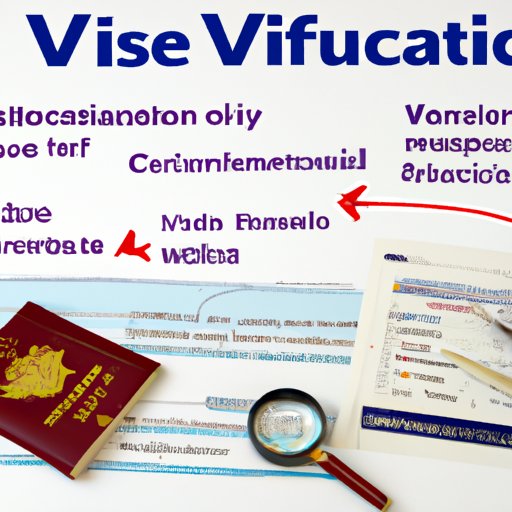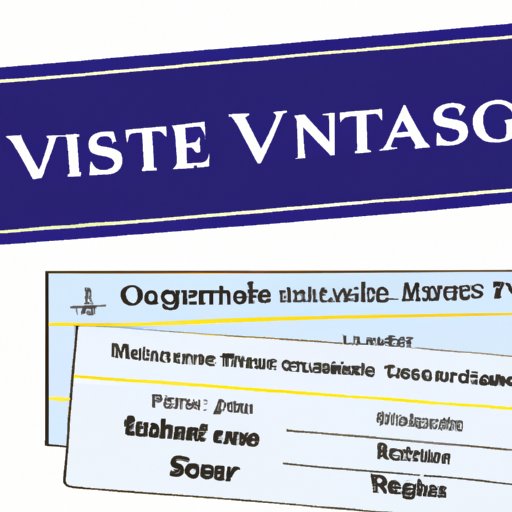
Overview of the French Visa Process
If you’re planning to travel to France, one of the first things you should do is find out whether or not you need a visa. Depending on your nationality, length of stay, and purpose of travel, you may be required to obtain a visa before entering the country. Knowing the visa requirements for France can help you plan your trip and avoid any potential issues.
A visa is an official document issued by a country’s government that allows a foreign national to enter, remain in, or transit through its territory. Visas come in a variety of forms, and the requirements for obtaining them vary depending on the type of visa and the individual’s country of origin.
When it comes to France, there are several types of visas available. These include tourist visas, business visas, student visas, and long-stay visas. Each type of visa has its own set of requirements, so it’s important to make sure you’re applying for the right one. Generally speaking, all visas require the applicant to have a valid passport, proof of funds to support their stay in France, and a valid return ticket.
What Countries are Exempt from the French Visa Requirement?
Certain countries are exempt from the French visa requirement. These include citizens of the European Union (EU), citizens of the Schengen Area, and citizens of certain other countries who are granted visa-free access to France.
The EU consists of 28 member states, including Austria, Belgium, Bulgaria, Croatia, Cyprus, the Czech Republic, Denmark, Estonia, Finland, France, Germany, Greece, Hungary, Ireland, Italy, Latvia, Lithuania, Luxembourg, Malta, the Netherlands, Poland, Portugal, Romania, Slovakia, Slovenia, Spain, Sweden, and the United Kingdom. Citizens of these countries do not need a visa to enter France.
The Schengen Area is an area composed of 26 European countries that have abolished passport and border control at their mutual borders. The Schengen Area includes Austria, Belgium, the Czech Republic, Denmark, Estonia, Finland, France, Germany, Greece, Hungary, Iceland, Italy, Latvia, Liechtenstein, Lithuania, Luxembourg, Malta, the Netherlands, Norway, Poland, Portugal, Slovakia, Slovenia, Spain, Sweden, and Switzerland. Citizens of these countries do not need a visa to enter France.
In addition, citizens of certain other countries are granted visa-free access to France for stays of up to 90 days within a 180-day period. These countries include Australia, Canada, Japan, New Zealand, and the United States.
How to Determine if You Need a Visa to Enter France
The best way to determine if you need a visa to enter France is to check the visa requirements for your country of origin. You can usually find this information on the website of the French Embassy or Consulate in your country. It’s also important to make sure you have a valid passport with at least six months of validity remaining. If your passport expires before your planned departure date, you will need to apply for a new passport before you can apply for a visa.
You should also consider the length and purpose of your stay in France. If you plan to stay for more than 90 days or if you plan to work, study, or conduct business activities in France, you will need to apply for a visa. On the other hand, if you plan to stay for less than 90 days for tourism purposes only, you may be eligible for visa-free entry.
Applying for a French Visa
If you need to apply for a visa, the first step is to gather the necessary documents. These include a valid passport, two recent passport-sized photos, proof of funds to support your stay, a completed application form, and proof of accommodation. You may also be required to provide additional documents, such as a letter of invitation or a certificate of employment.
Once you have the necessary documents, you can fill out the application form. This form can usually be found on the website of the French Embassy or Consulate in your country. After you have filled out the form, you will need to submit it to the Embassy or Consulate along with the other required documents. The processing time for a visa application varies depending on the type of visa and the Embassy or Consulate, so you should allow plenty of time for your application to be processed.
The Cost of Obtaining a French Visa
The cost of obtaining a French visa depends on the type of visa and the Embassy or Consulate where you are applying. Generally speaking, visa fees range from €60 to €99. In addition to the visa fee, you may also be required to pay additional processing fees. These fees can range from €50 to €150, depending on the Embassy or Consulate.

Tips for a Smooth Application Process
To ensure a smooth application process, it’s important to begin the application process early. Depending on the type of visa you are applying for, the processing time can take anywhere from a few weeks to several months. Therefore, it’s best to start the process as soon as possible. It’s also important to double check all the documents you are submitting to make sure everything is accurate and complete. Finally, make sure you have the required funds to cover the visa fee and any additional processing fees.

Alternatives to Obtaining a Visa for France
If you are a citizen of a country that is not exempt from the visa requirement and you do not wish to apply for a visa, there are a few alternatives. One option is to apply for an Electronic Travel Authorization (ETA). An ETA is an online authorization for short stays in France, and it is valid for up to 90 days within a 180-day period. Another option is to apply for a long-stay visa, which is valid for stays of up to six months. Finally, if you are planning to study in France, you can apply for a student visa.
No matter what type of visa you decide to apply for, it’s important to familiarize yourself with the visa requirements for France. Knowing the requirements can help you plan your trip and avoid any potential issues.
(Note: Is this article not meeting your expectations? Do you have knowledge or insights to share? Unlock new opportunities and expand your reach by joining our authors team. Click Registration to join us and share your expertise with our readers.)
